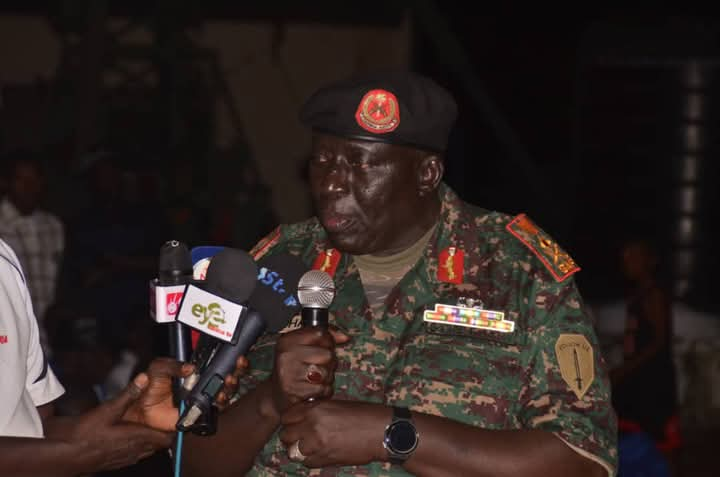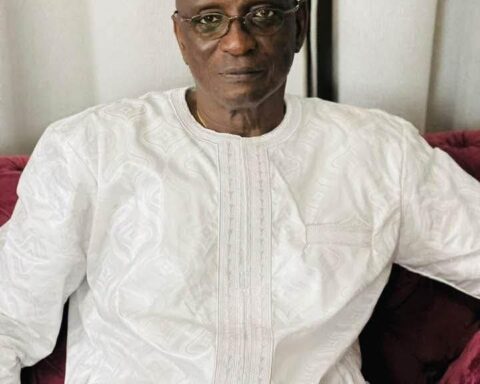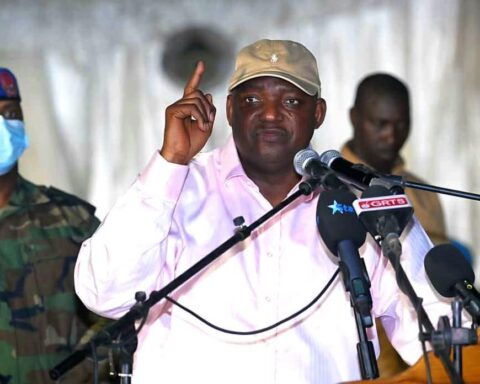Rohey Malick Lowe, the sitting Mayor of Banjul City Council since 2018, testified before the Local Government Commission of Inquiry on Tuesday, 13 May 2025, claiming that real control over the council’s finances lies not with the elected mayor but with the Chief Executive Officer (CEO), whom she described as the sole authority in authorizing expenditure. In her lengthy testimony, Mayor Lowe portrayed her office as largely symbolic in financial matters, sparking concerns over administrative dominance and legal compliance in municipal governance.
Appearing with a six-page written statement dated 5 March 2025—which was admitted into evidence—Mayor Lowe answered questions from Lead Counsel Patrick Gomez about her role, the nomination of councillors, council committees, development planning, financial oversight, and her understanding of relevant legislation guiding the operations of BCC. Her responses revealed significant gaps in recordkeeping, accountability structures, and legal adherence at the capital’s city council over the past five years.
According to Mayor Lowe, BCC in 2018 comprised 13 councillors—nine elected and four nominated. She named the nominated councillors as Anne Secka (representing social groups), Fintong Njie (women’s representative), Abdoulie Krubally (youth representative), and Basiru Ndow (business community). “I nominated them,” she said initially, but later admitted she could not recall the process by which they were nominated. She claimed, for example, that the youth representative was actually chosen by the youth of Banjul, not directly by her.
The Commission requested documentary evidence supporting these claims, asking her to provide the nomination letter from the youth groups as well as the Ministry’s confirmation of all nominations. Mayor Lowe agreed to submit those documents, while acknowledging that the Ministry of Lands and Regional Government had ultimately approved the appointments.
On council meetings, the mayor said the General Council typically convened once every month unless there was an urgent matter requiring an emergency session. She also disclosed the existence of four council committees: Finance, Establishment and Appointment, Youths and Sports, and a fourth committee she said she could not immediately recall. Membership of these committees, she explained, was determined by the full council. However, no records of the appointment process or criteria used to assign members to these committees were presented at the hearing.
When questioned about governance and planning documents, Mayor Lowe said that in 2018, the council developed a Strategic Plan and a corresponding Action Plan. She could not recall the exact duration of these plans, nor details about their implementation, and the Commission instructed her to submit copies of both documents. Strategic and action plans are expected to guide the priorities, timelines, and deliverables of a local council, and the lack of clarity on these core documents raised questions about the council’s developmental direction.
The mayor’s unfamiliarity with legislative instruments also drew sharp scrutiny from the Commission. Lead Counsel Gomez asked her what legal frameworks she relied on for the effective management of the council. “On my part, I relied on the Local Government Act and the good practice of the former mayors,” she said. When prompted to define what she meant by “good practice,” Lowe mentioned discretionary donations to religious organizations, provision of scholarships, and support to sports associations—activities she said had specific budget lines within the council’s annual estimates.
However, Mayor Lowe admitted she had limited knowledge of the Finance and Audit Act and the Financial Manual—two essential governance instruments that regulate public financial management. “I do not concentrate on them too much because they deal with finance, administration and audit,” she said. Gomez followed up, asking whether she believed those laws were only for finance and administrative officers. She replied: “We need them, but they need it more than us.”
When asked to clarify, she said: “When you say Finance and Audit Act, it is about money.” Gomez pushed back, “Is that all?” to which she responded, “Yes. I am not a master in that.”
The most contentious part of the testimony came during an extended exchange on who holds the power to authorize spending at BCC. When Gomez asked who had authority over expenditure, Mayor Lowe answered unequivocally: “The CEO.” She described the CEO as the council’s accounting officer, adding: “I only advise. The CEO and others implement.”
She further stated that while she may express views on how funds should be spent, the CEO had final authority—and could reject her input outright. “The CEO has the exclusive powers to make expenditure. He can choose not to adhere to my advice. I can tell him do this and he says no,” she said.
Lead Counsel Gomez reminded her that thisMayor Lowe Says CEO Controls Council Spending, Denies Mayoral Authority in BCC Affairs
By [Your Name]
BANJUL — Rohey Malick Lowe, the sitting Mayor of Banjul City Council since 2018, testified before the Local Government Commission of Inquiry on Tuesday, 13 May 2025, claiming that real control over the council’s finances lies not with the elected mayor but with the Chief Executive Officer (CEO), whom she described as the sole authority in authorizing expenditure. In her lengthy testimony, Mayor Lowe portrayed her office as largely symbolic in financial matters, sparking concerns over administrative dominance and legal compliance in municipal governance.
Appearing with a six-page written statement dated 5 March 2025—which was admitted into evidence—Mayor Lowe answered questions from Lead Counsel Patrick Gomez about her role, the nomination of councillors, council committees, development planning, financial oversight, and her understanding of relevant legislation guiding the operations of BCC. Her responses revealed significant gaps in recordkeeping, accountability structures, and legal adherence at the capital’s city council over the past five years.
According to Mayor Lowe, BCC in 2018 comprised 13 councillors—nine elected and four nominated. She named the nominated councillors as Anne Secka (representing social groups), Fintong Njie (women’s representative), Abdoulie Krubally (youth representative), and Basiru Ndow (business community). “I nominated them,” she said initially, but later admitted she could not recall the process by which they were nominated. She claimed, for example, that the youth representative was actually chosen by the youth of Banjul, not directly by her.
The Commission requested documentary evidence supporting these claims, asking her to provide the nomination letter from the youth groups as well as the Ministry’s confirmation of all nominations. Mayor Lowe agreed to submit those documents, while acknowledging that the Ministry of Lands and Regional Government had ultimately approved the appointments.
On council meetings, the mayor said the General Council typically convened once every month unless there was an urgent matter requiring an emergency session. She also disclosed the existence of four council committees: Finance, Establishment and Appointment, Youths and Sports, and a fourth committee she said she could not immediately recall. Membership of these committees, she explained, was determined by the full council. However, no records of the appointment process or criteria used to assign members to these committees were presented at the hearing.
When questioned about governance and planning documents, Mayor Lowe said that in 2018, the council developed a Strategic Plan and a corresponding Action Plan. She could not recall the exact duration of these plans, nor details about their implementation, and the Commission instructed her to submit copies of both documents. Strategic and action plans are expected to guide the priorities, timelines, and deliverables of a local council, and the lack of clarity on these core documents raised questions about the council’s developmental direction.
The mayor’s unfamiliarity with legislative instruments also drew sharp scrutiny from the Commission. Lead Counsel Gomez asked her what legal frameworks she relied on for the effective management of the council. “On my part, I relied on the Local Government Act and the good practice of the former mayors,” she said. When prompted to define what she meant by “good practice,” Lowe mentioned discretionary donations to religious organizations, provision of scholarships, and support to sports associations—activities she said had specific budget lines within the council’s annual estimates.
However, Mayor Lowe admitted she had limited knowledge of the Finance and Audit Act and the Financial Manual—two essential governance instruments that regulate public financial management. “I do not concentrate on them too much because they deal with finance, administration and audit,” she said. Gomez followed up, asking whether she believed those laws were only for finance and administrative officers. She replied: “We need them, but they need it more than us.”
When asked to clarify, she said: “When you say Finance and Audit Act, it is about money.” Gomez pushed back, “Is that all?” to which she responded, “Yes. I am not a master in that.”
The most contentious part of the testimony came during an extended exchange on who holds the power to authorize spending at BCC. When Gomez asked who had authority over expenditure, Mayor Lowe answered unequivocally: “The CEO.” She described the CEO as the council’s accounting officer, adding: “I only advise. The CEO and others implement.”
She further stated that while she may express views on how funds should be spent, the CEO had final authority—and could reject her input outright. “The CEO has the exclusive powers to make expenditure. He can choose not to adhere to my advice. I can tell him do this and he says no,” she said.
Lead Counsel Gomez reminded her that this interpretation does not align with provisions under7 the Local Government Act, which grants executive powers to elected mayors to provide oversight and direction. “That is not what the law provides. You have power, too,” Gomez said.
“I do not think mayors in The Gambia have power,” Mayor Lowe replied. She went on to describe her position as largely ceremonial when it comes to institutional control. “The mayor cannot discipline, promote, demote or take any decision against any person. The mayor cannot spend anything,” she added.
Throughout the hearing, Mayor Lowe’s testimony painted a picture of a governance environment in which professional administrators—particularly the CEO—are the de facto decision-makers, even in areas where legislation gives the elected mayor a defined leadership role. Her remarks revealed an apparent power imbalance that raises concerns about the effectiveness of democratic local governance and the role of elected officials.
Her assertions also echo broader concerns emerging across multiple councils under investigation by the Commission, where mayors and chairpersons have cited similar limitations in their ability to implement or even supervise key decisions. The tension between political leadership and bureaucratic authority is one of the underlying themes that the Inquiry is expected to address in its final recommendations.
As the Inquiry continues to unravel the layers of institutional dysfunction in local government structures, Mayor Lowe’s testimony stands out for its candor—and for the troubling suggestion that mayors may be sidelined from the very processes they are elected to oversee.
The Commission has requested that Mayor Lowe return with documentary evidence relating to council nominations, strategic and action plans, and letters of ministerial confirmation. Her future testimony, along with that of BCC’s senior administrative officers, will likely determine the extent of procedural breaches, legal violations, and governance failures during her tenure.
interpretation does not align with provisions under the Local Government Act, which grants executive powers to elected mayors to provide oversight and direction. “That is not what the law provides. You have power, too,” Gomez said.
“I do not think mayors in The Gambia have power,” Mayor Lowe replied. She went on to describe her position as largely ceremonial when it comes to institutional control. “The mayor cannot discipline, promote, demote or take any decision against any person. The mayor cannot spend anything,” she added.
Throughout the hearing, Mayor Lowe’s testimony painted a picture of a governance environment in which professional administrators—particularly the CEO—are the de facto decision-makers, even in areas where legislation gives the elected mayor a defined leadership role. Her remarks revealed an apparent power imbalance that raises concerns about the effectiveness of democratic local governance and the role of elected officials.
More to come when she reappears.








